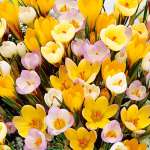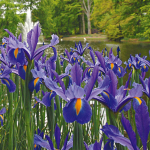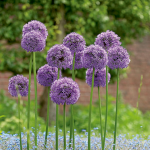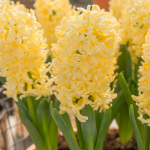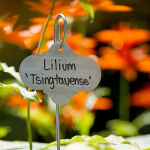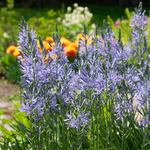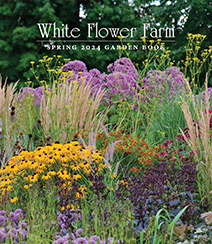Product Details
Allium 'Pink Jewel' features lovely light pink florets that form 3″ flower heads in June and July above fresh green foliage. Our Dutch grower recommends combining them with the slightly smaller, dark wine-red blooms of Allium atropurpureum for an eye-catching display.
The genus Allium (the Latin means "garlic") offers colorful, distinctive, and long-lasting forms that are standouts in the early summer garden. Alliums are sun-lovers and prefer well-drained, even sandy, soil. Deer, mice, chipmunks, and related predators generally avoid this group, so you can plant with impunity. Tuck them among clumps of later summer-flowering perennials where the Alliums' withering foliage will be hidden by the expanding perennials.
For more information on the growing and care of Allium, click Growing Guide.
Shipping
HOW PLANTS ARE SHIPPED
The size of the plants we ship has been selected to reduce the shock of transplanting. For some, this means a large, bareroot crown. Others cannot travel bareroot or transplant best if grown in containers. We ship these perennials and annuals in 1 pint pots, except as noted. We must point out that many perennials will not bloom the first year after planting, but will the following year, amply rewarding your patience. We ship bulbs as dormant, bare bulbs, sometimes with some wood shavings or moss. Shrubs, Roses, vines, and other woody plants may be shipped bareroot or in pots. The size of the pot is noted in the quick facts for each item.
WHEN WE SHIP
We ship our bulbs and plants at the right time for planting in your area, except as noted, with orders dispatched on a first-come, first-served basis by climate zone. We also ship a wide range of containers and planters, tools, supplies, fertilizers, garden wear, garden decor items, as well as indoor decorations like wreaths and dried bouquets when available. Estimated dates for shipping are indicated in the green Shipping Details box for each item. Please supply a street address for delivery. Kindly contact us with two weeks notice, if you'll be away at the expected time of delivery.
OUR GUARANTEE
We guarantee to ship plants that are in prime condition for growing. If your order is damaged or fails to meet your expectations, we will cheerfully replace or refund it. Please contact our Customer Service Department at 1-800-503-9624 or email us at [email protected]. Please include your order number or customer number when contacting us.
Reviews
Growing guide
Latin Name Pronunciation: al'ee-um
Bulb size: 22-24 cm/12-14 cm/6-8 cm (depending on variety)
The genus Allium (the Latin means "garlic") includes many garden plants that grow from bulbs or bulb-like rhizomes. Allium flowers form dense balls of color at the top of strong stems, and they make excellent displays in the garden or in bouquets. Allium flowers range from purple, burgundy, lilac, silvery amethyst, pink, blue, to yellow and white. Some varieties have scented blooms, but their perfume is usually pleasant and not the least oniony. The scent of the bulbs and leaves, however, may remind you of onions.
Light/Watering: Most Alliums grow best in full sun, with at least 6–8 hours of direct sun a day. Those we offer require well-drained soil and are longest lived in locations where the soil is on the dry side during summer dormancy.
Planting: Plant Alliums more shallowly than comparably sized bulbs, just 1–2 times the diameter of the bulb deep.
Fertilizer/Soil and pH: Alliums prefer well-drained, fertile soil. Fertilize in fall and spring with any bulb fertilizer.
Continuing Care: The leaf tips of many varieties, especially the tall ones, begin to brown before bloom time. Remove the spent flowers (except from varieties that are sterile, such as 'Globemaster') if you wish to prevent them from self-sowing.
Pests/Diseases: Alliums have few problems except when planted too shallowly or in wet soil.
Companions: Place Alliums behind heavy-foliage plants such as Peonies and Iris. Good for bedding, and in mixed borders. Flower heads are good for drying.
Dividing/Transplanting: Alliums rarely need transplanting or dividing, but this can be done when the bulbs are dormant.

 (1 Review)
(1 Review)

